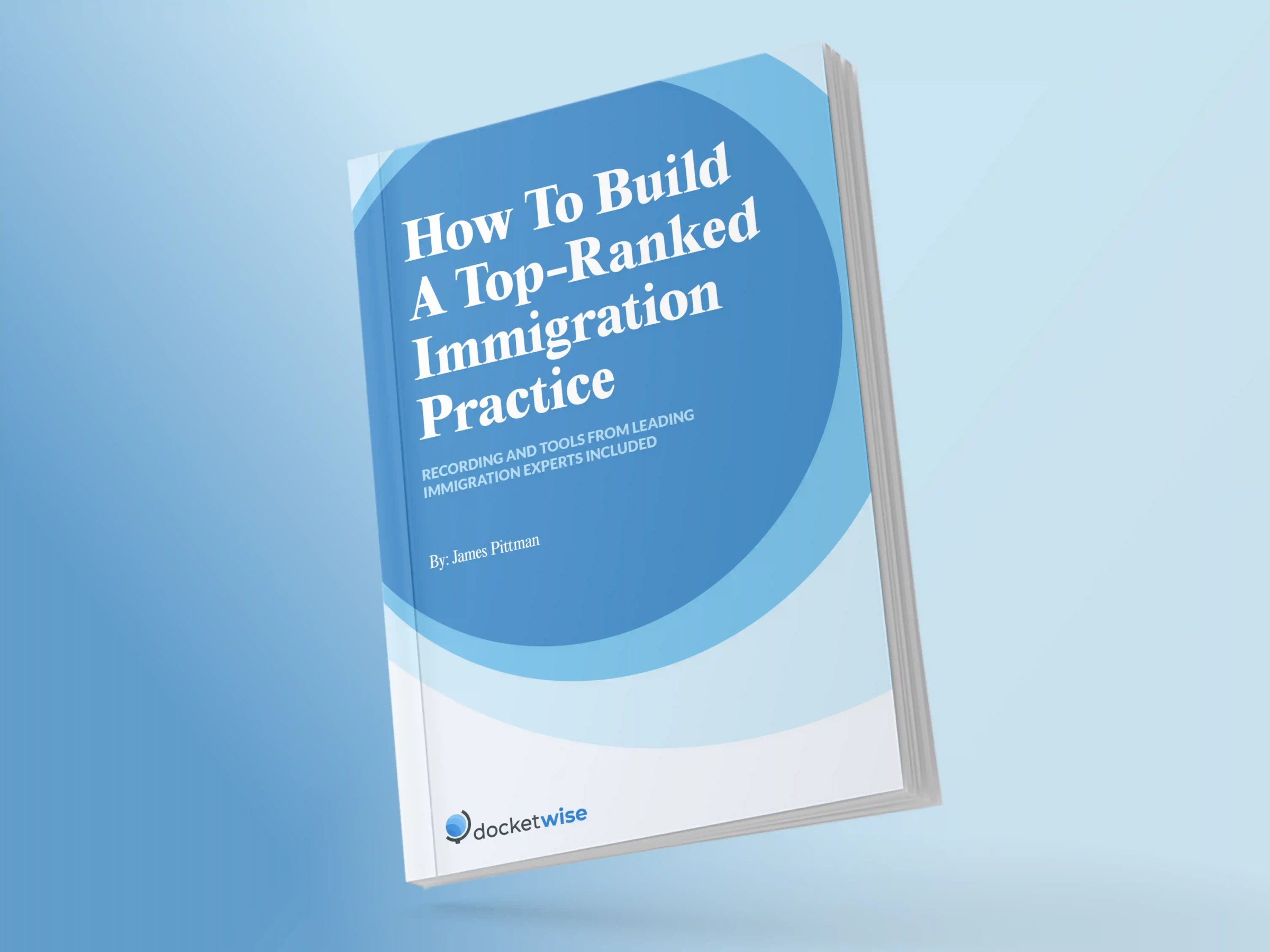Since COVID sent millions of professionals home, and as office space demand continues to remain lower than pre-pandemic, immigration lawyers who want to go back into an office environment without committing to a full-time, dedicated space, and who want to ensure COVID safety protocols, are increasingly looking to coworking spaces.
For a law firm that can’t or doesn’t want to support a long-term office lease, coworking spaces provide more flexible arrangements to access a space where you can meet with staff, clients, or both, but only as needed. And while it may seem like the concept of coworking spaces is new, it actually isn’t.
This article will discuss how coworking spaces work and some pros and cons of coworking spaces, especially for immigration lawyers. We’ll go over how you, as an immigration lawyer, can use a coworking space to your advantage for a more flexible office arrangement that gives you space to cultivate in-person interactions with your clients, staff, and colleagues.
A brief history of coworking and how it has become a stable alternative to traditional office space
Today, we associate coworking spaces with tech companies, freelancers, or startup founders. The concept of coworking has changed since it started in Germany in the mid-90s, and was mostly geared towards hackers. By the end of the 90s, the first space with flexible seating options for individuals and teams had opened in New York.
In 2005, coworking spaces became more mainstream when a startup entrepreneur from California named Brad Neuberg opened what is considered the first coworking space. His goal was to create a space where he and others could take advantage of the increased productivity that occurs when people collaborate, while maintaining the freedom to work on his own. If you’ve decided to take your practice fully remote, a coworking space could be a place to interact with other professionals and meet in person with your staff and your clients without keeping a permanent office you don’t need year round.
The coworking industry has grown so much that by 2012, there were over 2,000 established coworking spaces worldwide. By 2024, the number of coworking spaces around the world is expected to grow to over 40,000, through a combination of global franchises such as WeWork, and smaller franchises operating at the local level with a small number of locations in one country.
As a result of the pandemic, we are seeing traditional urban office spaces tinkering with providing co-working opportunities, as well as a rising number of coworking spaces, often set up by specific companies for their employees closer to the suburbs so people can enjoy shorter commutes.
So, after seeing the possibilities that a coworking space could offer, let’s look ahead and consider the advantages and disadvantages a coworking space could have for an immigration lawyer.
Pros vs. Cons of co-working spaces for immigration law firms
There are pros and cons to using a coworking space as an immigration lawyer that you should consider before looking around. Let’s get right into it:
Pros:
Work near others and concentrate better. While for some, working fully remotely from home is ideal, for those who do want an office environment without leasing an office full-time, you get to be around other people, which has been proven to help you concentrate (like in cafes).
Amenities that are harder to have at home. You get access to amenities that are tougher and more expensive to fully have at home, like fax machines and large printers, professional cleaning, constantly flowing tea, coffee, and snacks, etc. This can be very helpful, especially in the beginning when you night be on a limited budget, or may need access to, say, a printer, during high volume times of year like H-1B cap season.
Professional networking and socializing. At a coworking space, you get to take advantage of professional or social activities. This is especially great for solo lawyers who might not have coworkers - co-working spaces often have social events, even if socially distanced during COVID, which can be a nice way to meet new people, expand your professional network, attend informative sessions, and connect with community members who could eventually become partners or clients.
Flexible arrangements based on your budget and needs. If it's just you and your computer, you can sit at a "hot desk" which is typically cheaper. If you need a conference room for a call, you can rent one by the hour instead of renting an entire office. Or if you rent an enclosed room at a coworking space, while pricier than just having an open desk, it's still much cheaper than renting a full "office" the traditional way.
Building business. If you do immigration for startups or other small businesses, you can actually network with others in the co-working space in case they may need your immigration services, or build your network through referrals.
Cons:
Taking impromptu calls with clients may be challenging. If you sit out in the open, others around you might be able to hear your conversation, which is annoying at best or, even worse, could be inadequate to protect your client’s confidentiality. If you want to rent a conference call or phone booth, it might not be available when you need it.
Client hesitation. Clients may be wary of meeting you at a coworking space, even if you schedule the in-person meeting in a conference or meeting room. Knowing that a lot of other people are around, and not being in a totally private environment may make them feel uncomfortable.
Potential COVID exposure. In today's time, there may still be an increased risk of COVID exposure simply based on the fact that people go in and out of co-working spaces constantly. Most co-working spaces, especially today, are extremely diligent with cleaning (e.g. WeWork or Industrious), but for some people that may still not be enough.
Space and customization limitations. Unless you become a major co-working space customer, space still tends to be limited for regular companies. Even if you get a dedicated enclosed office for your practice, they’re typically still quite small, and can't be customized much.
Weighing these options, you can choose whether a co-working space is right for you. Here are a few of the bigger co-working spaces around the US and internationally, though check your area to see if there are local co-working spaces that might fit your needs better.
Wherever you choose to work, keep your immigration case management consistent with Docketwise
Wherever you decide to run your immigration practice, whether fully from home, at a traditional office, or somewhere in between at a coworking space, you need a cloud-based immigration case management platform to keep your practice safe, secure, and perhaps most importantly, mobile and flexible, just like you. With Docketwise, you can streamline your immigration casework so you can focus on what’s most important: supporting your clients, without worrying you left something at the office.
From a full library of immigration forms to client questionnaires in multiple languages to an industry-leading set of API integrations, we help you stay up to date on all your cases, communicate easily with your clients, and otherwise build and manage your firm.
If you want to learn more about Docketwise, schedule a demo at the link below, or sign up for our Immigration Briefings newsletter for daily and weekly immigration updates!
Unlock Your Success as an Immigration Lawyer.
Download Now
About the author

James PittmanAttorney & Co-FounderDocketwise
James Pittman is co-founder of Docketwise and was previously engaged in the private practice of US Immigration Law. He also regularly teaches Continuing Legal Education (CLE) classes on immigration law topics and legal ethics. He is admitted to practice in New York and New Jersey and is a graduate of Northeastern University School of Law.
